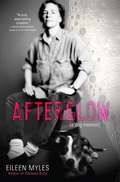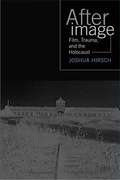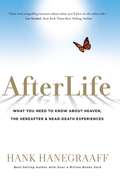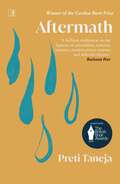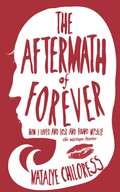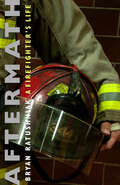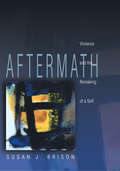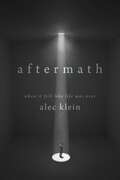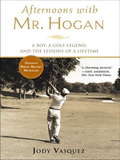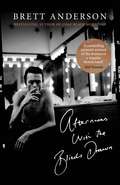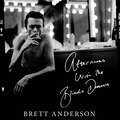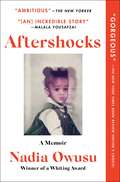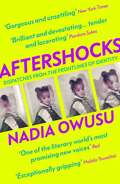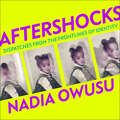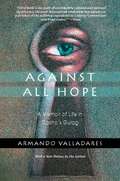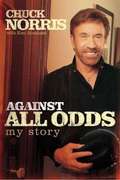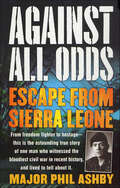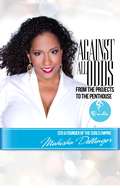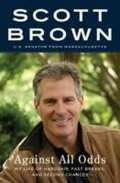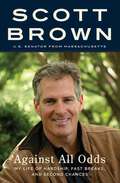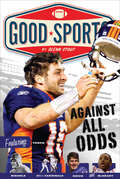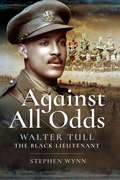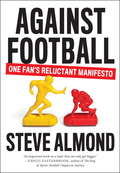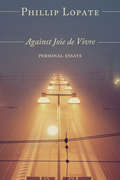- Table View
- List View
Afterglow: A Dog Memoir
by Eileen Myles<P>This newest book paints a kaleidoscopic portrait of a beloved confidant: the pit bull called Rosie. <P>In 1990, Myles chose Rosie from a litter on the street, and their connection instantly became central to the writer’s life and work. During the course of their sixteen years together, Myles was madly devoted to the dog’s wellbeing, especially in her final days. Starting from the emptiness following Rosie’s death, Afterglow (a dog memoir) launches a heartfelt and fabulist investigation into the true nature of the bond between pet and pet-owner. Through this lens, we witness Myles’s experiences with intimacy and spirituality, celebrity and politics, alcoholism and recovery, fathers and family history, as well as the fantastical myths we spin to get to the heart of grief. <P>Moving from an imaginary talk show where Rosie is interviewed by Myles’s childhood puppet to a critical reenactment of the night Rosie mated with another pit bull, from lyrical transcriptions of their walks to Rosie’s enlightened narration from the afterlife, Afterglow (a dog memoir) illuminates all that it can mean when we dedicate our existence to a dog.
Afterimage: Film, Trauma, and the Holocaust
by Joshua HirschThe appearance of Alain Resnais' 1955 French documentaryNight and Fogheralded the beginning of a new form of cinema, one that used the narrative techniques of modernism to provoke a new historical consciousness. Afterimagepresents a theory of posttraumatic film based on the encounter between cinema and the Holocaust. Locating its origin in the vivid shock of wartime footage,Afterimagefocuses on a group of crucial documentary and fiction films that were pivotal to the spread of this cinematic form across different nations and genres. Joshua Hirsch explores the changes in documentary brought about by cinema verite, culminating in Shoah. He then turns to the appearance of a fictional posttraumatic cinema, tracing its development through the vivid flashbacks in Resnais'Hiroshima, mon amourto the portrayal of pain and memory inThe Pawnbroker. He excavates a posttraumatic autobiography in three early films by the Hungarian IstvÁn SzabÓ. Finally, Hirsch examines the effects of postmodernism on posttraumatic cinema, looking atSchindler's Listand a work about a different form of historical trauma,History and Memory, a videotape dealing with the internment of Japanese Americans during the Second World War. Sweeping in its scope,Afterimagepresents a new way of thinking about film and history, trauma and its representation. Author note: Joshua Hirschis visiting lecturer in Film and Electronic Arts at the California State University, Long Beach.
Afterlife: What You Really Want to Know About Heaven, the Hereafter, & Near-Death Experiences
by Hank Hanegraaff[Back Cover]: "New York Times bestsellers on near-death experiences depict--A 3-year-old who meets Jesus and his rainbow-colored horse; A neurosurgeon encountering Om and the Orb on the wing of a butterfly; [and] A real estate broker descending to earth's center to discover hell is 300 degrees and zero humidity. Do such exotic experiences provide trustworthy information about the afterlife? If not, how can we know what happens beyond death's door? In AfterLife, Hank Hanegraaff, one of the most remarkable theological minds of our time, explains how life in the present intersects with life after life and ultimately life after life after life. With laser-sharp clarity this surprisingly insightful book demonstrates that death is not the end--in fact, it's just the beginning. AfterLife will forever change the way you view your eternal destiny!"
Aftermath
by Preti TanejaWinner of the 2022 Gordon Burn PrizeShortlisted for 2023 British Book Awards Book of the Year in the Discover category Usman Khan was convicted of terrorism-related offences at age 20, and sent to high-security prison. He was released eight years later, and allowed to travel to London for one day, to attend an event marking the fifth anniversary of a prison education programme he participated in. On 29 November 2019, he sat with others at Fishmongers&’ Hall, some of whom he knew. Then he went to the bathroom to retrieve the things he had hidden there: a fake bomb vest and two knives, which he taped to his wrists. That day, he killed two people: Saskia Jones and Jack Merritt. Preti Taneja taught fiction writing in prison for three years. Merritt oversaw her program; Khan was one of her students. &‘It is the immediate aftermath,&’ Taneja writes. &‘&“I am living at the centre of a wound still fresh.&” The I is not only mine. It belongs to many.&’ In this searching lament by the award-winning author of We That Are Young, Taneja interrogates the language of terror, trauma and grief; the fictions we believe and the voices we exclude. Contending with the pain of unspeakable loss set against public tragedy, she draws on history, memory, and powerful poetic predecessors to reckon with the systemic nature of atrocity. Blurring genre and form, Aftermath is a profound attempt to regain trust after violence and to recapture a politics of hope through a determined dream of abolition.
Aftermath of Forever: How I Loved and Lost and Found Myself. The Mix Tape Diaries (Punx Ser.)
by Natalye ChildressThe Aftermath of Forever: How I Loved and Lost and Found Myself is a memoir that chronicles the romantic coming-of-age of a woman in her 20s experiencing dating in the San Francisco Bay Area. After the disappointment of a failed marriage, Natalye Childress embarks on a soul-searching journey to discover what happens when the one you thought you would be with forever breaks your heart. Using music as a vehicle to express herself, she revisits ten men from her past and paints a portrait of their relationships through the mixtapes she has made them. Her quest for love takes the form of delving into the hedonistic world of noncommittal beaus, abusive boyfriends, and friends with benefits. She candidly dissects her love life on the page as she shares the inspiring and hopeful moments alongside the awkward and painful realizations that accompany dating in the present day, when everyone is looking for something different. These men, although they leave her life almost as quickly as they entered it, collectively help shape her future as she embarks on a quest not only to find love, but to find herself. Ultimately, she learns the age-old lesson that in order to truly be loved, she needs to first love herself.
Aftermath: A Firefighter's Life
by Bryan Ratushniak“Powerful, honest, & moving.” — Open BookWho doesn’t rush to the window when a fire truck rushes by? Bryan Ratushniak, has spent a thirty-two-year career working on the busiest fire trucks in Canada and has detailed his adventures in this witty memoir. The book details the emotional damage inflicted by the horrors of the job and how the author came out the other side more or less in one piece. Ratushniak shares the ups and downs of balancing home and professional life while trying to hold onto his sanity. Aftermath: A Firefighter’s Life is filled with candid, humorous, tragic, and hopeful stories from behind the “big red doors.”
Aftermath: Violence and the Remaking of a Self
by Susan J. BrisonOn July 4, 1990, while on a morning walk in southern France, Susan Brison was attacked from behind, severely beaten, sexually assaulted, strangled to unconsciousness, and left for dead. She survived, but her world was destroyed. Her training as a philosopher could not help her make sense of things, and many of her fundamental assumptions about the nature of the self and the world it inhabits were shattered. At once a personal narrative of recovery and a philosophical exploration of trauma, this book examines the undoing and remaking of a self in the aftermath of violence. It explores, from an interdisciplinary perspective, memory and truth, identity and self, autonomy and community. It offers imaginative access to the experience of a rape survivor as well as a reflective critique of a society in which women routinely fear and suffer sexual violence. As Brison observes, trauma disrupts memory, severs past from present, and incapacitates the ability to envision a future. Yet the act of bearing witness, she argues, facilitates recovery by integrating the experience into the survivor's life's story. She also argues for the importance, as well as the hazards, of using first-person narratives in understanding not only trauma, but also larger philosophical questions about what we can know and how we should live. Bravely and beautifully written, Aftermath is that rare book that is an illustration of its own arguments.
Aftermath: When It Felt Like Life Was Over
by Alec KleinFor years, Alec Klein investigated cases where people faced the nightmare of wrongful accusations. Suddenly, he found himself on the other side, falsely accused himself.For years, Alec Klein investigated cases where people faced the nightmare of wrongful accusations. Suddenly, he found himself on the other side, falsely accused himself. In a coordinated media attack, he was accused of misconduct as a professor at a top U.S. university, and in a rush to judgment, before he had a chance to defend himself, his life was destroyed. What happens when you have little hope? In the aftermath, Alec gravitated to the unlikeliest of places, among the unlikeliest of people, doing the unlikeliest of things. This is a first-person true story about faith, forgiveness and redemption.
Afternoons with Mr. Hogan
by Jody VasquezBen Hogan's former ball shagger recounts firsthand stories of the golf legend—andreveals, for the first time, Hogan's Swing Secret, a source of mystery to golfers for more than fifty years. Ben Hogan's pro golf record is legendary. A four-time PGA Player of the Year, he celebrated sixty-three tournament wins and became known as a man of few words and fewer close friends. Most of what we know about Hogan has been based on myth and speculation. Until now. In the 1960s, though Hogan's competitive career was over, he kept the practice habits that made him famous and remade modern competitive golf. He hired seventeen-year-old Jody Vasquez to help. Each day, after driving to a remote part of the course at Shady Oaks Country Club, Hogan would spend hours hitting balls and Vasquez would retrieve them. There, and over the course of their twenty-year friendship, Hogan taught Jody the mechanics of his famous swing and shared his thoughts on playing, practicing, and course management—unknowingly revealing much about his character, values, and beliefs, and the events that shaped them. In Afternoons with Mr. Hogan, Jody Vasquez shares dozens of stories about Hogan, from the way he practiced, selected his clubs, and interacted with other star players to his little-known humor and generosity. Combining the gentle insight of Tom Kite's A Fairway to Heaven (which recalls Kite's golf education under Harvey Penick) with the sage perspective of Penick's own Little Red Book, Vasquez's tribute is funny, poignant, and full of advice for golfers of all levels. .
Afternoons with the Blinds Drawn
by Brett Anderson'A compelling personal account of the dramas of a singular British band' Neil TennantThe trajectory of Suede - hailed in infancy as both 'The Best New Band in Britain' and 'effete southern wankers' - is recalled with moving candour by its frontman Brett Anderson, whose vivid memoir swings seamlessly between the tender, witty, turbulent, euphoric and bittersweet. Suede began by treading the familiar jobbing route of London's emerging new 1990s indie bands - gigs at ULU, the Camden Powerhaus and the Old Trout in Windsor - and the dispiriting experience of playing a set to an audience of one. But in these halcyon days, their potential was undeniable. Anderson's creative partnership with guitarist Bernard Butler exposed a unique and brilliant hybrid of lyric and sound; together they were a luminescent team - burning brightly and creating some of the era's most revered songs and albums.In Afternoons with the Blinds drawn, Anderson unflinchingly explores his relationship with addiction, heartfelt in the regret that early musical bonds were severed, and clear-eyed on his youthful persona. 'As a young man . . . I oscillated between morbid self-reflection and vainglorious narcissism' he writes. His honesty, sharply self-aware and articulate, makes this a compelling autobiography, and a brilliant insight into one of the most significant bands of the last quarter century.
Afternoons with the Blinds Drawn
by Brett Anderson'A compelling personal account of the dramas of a singular British band' Neil TennantThe trajectory of Suede - hailed in infancy as both 'The Best New Band in Britain' and 'effete southern wankers' - is recalled with moving candour by its frontman Brett Anderson, whose vivid memoir swings seamlessly between the tender, witty, turbulent, euphoric and bittersweet. Suede began by treading the familiar jobbing route of London's emerging new 1990s indie bands - gigs at ULU, the Camden Powerhaus and the Old Trout in Windsor - and the dispiriting experience of playing a set to an audience of one. But in these halcyon days, their potential was undeniable. Anderson's creative partnership with guitarist Bernard Butler exposed a unique and brilliant hybrid of lyric and sound; together they were a luminescent team - burning brightly and creating some of the era's most revered songs and albums.In Afternoons with the Blinds drawn, Anderson unflinchingly explores his relationship with addiction, heartfelt in the regret that early musical bonds were severed, and clear-eyed on his youthful persona. 'As a young man . . . I oscillated between morbid self-reflection and vainglorious narcissism' he writes. His honesty, sharply self-aware and articulate, makes this a compelling autobiography, and a brilliant insight into one of the most significant bands of the last quarter century.
Afternoons with the Blinds Drawn
by Brett Anderson'A compelling personal account of the dramas of a singular British band' Neil TennantThe trajectory of Suede - hailed in infancy as both 'The Best New Band in Britain' and 'effete southern wankers' - is recalled with moving candour by its frontman Brett Anderson, whose vivid memoir swings seamlessly between the tender, witty, turbulent, euphoric and bittersweet. Suede began by treading the familiar jobbing route of London's emerging new 1990s indie bands - gigs at ULU, the Powerhaus and the Old Trout in Windsor - and the dispiriting experience of playing a set to an audience of one. But in these halcyon days, their potential was undeniable. Anderson's creative partnership with guitarist Bernard Butler exposed a unique and brilliant hybrid of lyric and sound; together they were a luminescent team - burning brightly and creating some of the era's most revered songs and albums.In Afternoons with the Blinds drawn, Anderson unflinchingly explores his relationship with addiction, heartfelt in the regret that early musical bonds were severed, and clear-eyed on his youthful persona. 'As a young man . . . I oscillated between morbid self-reflection and vainglorious narcissism' he writes. His honesty, sharply self-aware and articulate, makes this a compelling autobiography, and a brilliant insight into one of the most significant bands of the last quarter century.
Aftershocks: A Memoir
by Nadia OwusuIn the tradition of The Glass Castle, this &“gorgeous&” (The New York Times, Editors&’ Choice) and deeply felt memoir from Whiting Award winner Nadia Owusu tells the &“incredible story&” (Malala Yousafzai) about the push and pull of belonging, the seismic emotional toll of family secrets, and the heart it takes to pull through. &“In Aftershocks, Nadia Owusu tells the incredible story of her young life. How does a girl—abandoned by her mother at age two and orphaned at thirteen when her beloved father dies—find her place in the world? This memoir is the story of Nadia creating her own solid ground across countries and continents. I know the struggle of rebuilding your life in an unfamiliar place. While some of you might be familiar with that and some might not, I hope you&’ll take as much inspiration and hope from her story as I did.&” —MALALA YOUSAFZAI ONE OF THE BEST BOOKS OF 2021 SELECTED BY VULTURE, TIME, ESQUIRE, NPR, AND VOGUE!Young Nadia Owusu followed her father, a United Nations official, from Europe to Africa and back again. Just as she and her family settled into a new home, her father would tell them it was time to say their goodbyes. The instability wrought by Nadia&’s nomadic childhood was deepened by family secrets and fractures, both lived and inherited. Her Armenian American mother, who abandoned Nadia when she was two, would periodically reappear, only to vanish again. Her father, a Ghanaian, the great hero of her life, died when she was thirteen. After his passing, Nadia&’s stepmother weighed her down with a revelation that was either a bombshell secret or a lie, rife with shaming innuendo. With these and other ruptures, Nadia arrived in New York as a young woman feeling stateless, motherless, and uncertain about her future, yet eager to find her own identity. What followed, however, were periods of depression in which she struggled to hold herself and her siblings together. &“A magnificent, complex assessment of selfhood and why it matters&” (Elle), Aftershocks depicts the way she hauled herself from the wreckage of her life&’s perpetual quaking, the means by which she has finally come to understand that the only ground firm enough to count on is the one written into existence by her own hand. &“Full of narrative risk and untrammeled lyricism&” (The Washington Post), Aftershocks joins the likes of Don&’t Let&’s Go to the Dogs Tonight and William Styron&’s Darkness Visible, and does for race identity what Maggie Nelson does for gender identity in The Argonauts.
Aftershocks: Dispatches from the Frontlines of Identity
by Nadia Owusu'One of the most moving books of the new year' STYLIST'Gorgeous and unsettling' NEW YORK TIMES'Brilliant and devastating...tender and lacerating' PANDORA SYKES'One of the literary world's most promising new voices' REDI have lived in disaster and disaster has lived in me. Our shared languages are thunder and reverberation.When Nadia Owusu was two years old her mother abandoned her and her baby sister and fled from Tanzania back to the US. When she was thirteen her beloved Ghanaian father died of cancer. She and her sister were left alone, with a stepmother they didn't like, adrift. Nadia Owusu is a woman of many languages, homelands and identities. She grew up in Rome, Dar-es-Salaam, Addis Ababa, Kumasi, Kampala and London. And for every new place there was a new language, a new identity and a new home. At times she has felt stateless, motherless and identity-less. At others, she has had multiple identities at war within her. It's no wonder she started to feel fault lines in her sense of self. It's no wonder that those fault lines eventually ruptured. Aftershocks is the account of how she hauled herself out of the wreckage. It is the intimate story behind the news of immigration and division dominating contemporary politics. Nadia Owusu's astonishingly moving and incredibly timely memoir is a nuanced portrait of globalisation from the inside in a fractured world in crisis.
Aftershocks: Dispatches from the Frontlines of Identity
by Nadia OwusuI have lived in disaster and disaster has lived in me. Our shared languages are thunder and reverberation.When Nadia Owusu was two years old her mother abandoned her and her baby sister and fled from Tanzania back to the US. When she was thirteen her beloved Ghanaian father died of cancer. She and her sister were left alone, with a stepmother they didn't like, adrift. Nadia Owusu is a woman of many languages, homelands and identities. She grew up in Rome, Dar-es-Salaam, Addis Ababa, Kumasi, Kampala and London. And for every new place there was a new language, a new identity and a new home. At times she has felt stateless, motherless and identity-less. At others, she has had multiple identities at war within her. It's no wonder she started to feel fault lines in her sense of self. It's no wonder that those fault lines eventually ruptured. Aftershocks is the account of how she hauled herself out of the wreckage. It is the intimate story behind the news of immigration and division dominating contemporary politics. Nadia Owusu's astonishingly moving and incredibly timely memoir is a nuanced portrait of globalisation from the inside in a fractured world in crisis.
Against All Hope
by Armando ValladaresArrested in 1960 for being philosophically and religiously opposed to communism, Armando Valladares was interned at Cuba's infamous Isla de Pinos Prison (from whose barred windows he watched the failure of the Bay of Pigs invasion). His life in Castro's gulag was a hell of violence and disease, putrid food and squalid living conditions, forced labor and solitary confinement, and hazardous escape attempts. Valladares survived by prayer and poetry. His writing, smuggled out to Europe and the U.S., made him one of the world's most celebrated prisoners of conscience. As a result of pressure from international human rights organizations, the Castro regime finally released him in 1982.When Against All Hope first appeared, it was immediately compared to Darkness at Noon and other classic prison narratives about the resilience of the human spirit in the face of totalitarianism. Now, with a new prologue by the author, which tells of his life since prison and brings the story of Cuban dissidence up to the case of Elian Gonzalez, this story of strength and survival is more relevant than ever.
Against All Odds
by Ken Abraham Chuck NorrisNorris describes himself as a shy youth who finally blossomed while studying martial arts as a soldier in South Korea. His self-deprecating humor shows through anecdotes about karate defeats, white-knuckled speaking engagements, and his failure to become a Los Angeles policeman, which led to his fame as a karate champion.
Against All Odds: Escape from Sierra Leone
by Phil AshbyAgainst All Odds is the incredible true story of that escape-and of the heart-pounding courage of Major Phil Ashby who defeated the rebel forces of Sierra Leone and became a living testament to the power of the human spirit and the sheer determination to survive. In West Africa's war-ravaged Sierra Leone no one was getting out alive. It took the courage of one man to change the odds.By 1990, Sierra Leone, once hailed as the 'Athens of West Africa', had degenerated into a savage battlefield, overtaken by rebel forces in a devastating civil war. Assigned to spearhead the mission as UN peacekeeper was Major Phil Ashby. But by 2000, the rebel occupation he had worked so diligently to disarm rose again to control an astounding two-thirds of the country. The enemy's mission: get rid of the outside opposition first. A number of Ashby's colleagues were tortured and finally butchered, and more than 500 were taken as hostages. Among the hostages was Phil Ashby. Miles from civilization, with no rescue in sight, Ashby and three of his men knew that their fate was up to them alone. Lost deep inside the rebels' heartland, unarmed, and outnumbered 20-to-1, Ashby devised a plan to escape from the hostile jungles that would test fate and challenge all reason.
Against All Odds: From the Projects to the Penthouse
by Mahisha DellingerFor Mahisha Dellinger, life in the rough streets of Sacramento, California was paving the way for a lifetime of poverty, despair and dysfunction. But while criminals ran rampant, gangs took over, and her own relatives chose drugs over dreams, Mahisha knew she was destined for something greater. Determined to write a different ending to her story, Mahisha set out to alter her destiny, through college and hard work. But her dreams were bigger than just a 9-5 job and she worked tirelessly to pursue her passion of owning her own hair care business. That dedication and commitment has paid off as Mahisha's company, CURLS LLC, is one of the leading natural hair care companies in the country.Against All Odds chronicles Mahisha's journey from the projects to the penthouse, how she overcame an impoverished beginning to lead a life of wealth, privilege and success....doing a job she loves. Complete with success tips to process in your own life, Against All Odds will show you how to turn your tragedy into triumph, no matter what the odds.
Against All Odds: My Life of Hardship, Fast Breaks, and Second Chances
by Scott BrownThe extraordinary personal journey of a man who, against all odds, rose to become one of America's most surprising and promising new political figures. Scott Brown's greatest win did not occur on a cold January election night in 2010 when he came from behind to capture the U. S. Senate seat held by Ted Kennedy for nearly fifty years; it began when he survived a savage beating at the drunken, dirty-fingernail hands of a stepfather when he was barely six years old, while trying to protect his mother. In this gripping memoir of resilience and redemption, Brown tells the story of his difficult, often nomadic childhood, shunted from house to apartment, and town to town, seventeen times over his first eighteen years. He somehow thrived despite a largely absent father, who married four separate times. So did his mother, in relationships frequently stained with alcohol, anger, and even violence. For nearly two decades' growing up, Brown endured innumerable hardships and challenges, even stealing food to eat. He was periodically sent off to live with relatives, his possessions wrapped in a few old blankets. Saved by basketball, he was the boy who shoveled snow from the public courts to shoot hoops alone in the frozen cold. With clear-eyed conviction and unflinching candor, Brown tells the story of his own bad-boy days, of the coaches who mentored him, and of how he found a way out of familial chaos through the swish of a ball in the net, winning a starting slot on the Tufts varsity basketball team as a freshman player and becoming the tenth-highest scorer to graduate in the school's history. His rise from there was even more improbable: a first-year law student and member of the Massachusetts National Guard, he was picked as Cosmopolitan magazine's "America's Sexiest Man" and was vaulted into the glamorous world of New York modeling at the height of the 1980s. But the man who was once ushered into the backrooms of Studio 54 returned to Massachusetts to continue with his military and legal training, settle down, raise a family, and soon found an unlikely path that would lead him to national political stardom. Here, too, are the secrets from the unprecedented Senate race that captured the country's imagination and how Scott Brown won his remarkable victory. Poignant, heartfelt, humorous, and profound, this is the story of one man's dream and his determination to fight for a better future.
Against All Odds: My Life of Hardship, Fast Breaks, and Second Chances
by Scott BrownAgainst All Odds is the extraordinary personal story of the man who rose up to meet the challenge of terrific opposition and become one of America's most promising new political figures—Senator Scott Brown. Brown is famous for succeeding popular Massachusetts Senator Ted Kennedy after Kennedy’s death in 2010—but, as he reveals in a compelling memoir reminiscent of Sarah Palin’s Going Rogue and Clarence Thomas’s My Grandfather’s Son, his experiences with struggle and achievement go back a lifetime.
Against All Odds: Never Give up (Good Sports Ser.)
by Glenn StoutTim Tebow and the Denver Broncos, Roy Reigels in the 1929 Rose Bowl, Frank Reich and the Buffalo Bills during the 1993 NFL playoffs, Tracy McGrady and the Houston Rockets in 2004, the entire St. Louis Cardinals team in the 2011 World Series . . . What do these players have in common? Every one of them was on the brink of a humiliating defeat. But at the moment when they could have called it quits, they didn’t. These five real-life stories, illustrated with black-and-white photographs, will inspire readers young and old.
Against All Odds: Walter Tull the Black Lieutenant
by Stephen WynnWalter Tull would have been a remarkable individual no matter when he had been born, but to achieve what he did, during the time that he did, makes him even more remarkable. He was an orphan at just six years of age, and despite not wanting to, his step mother, Clara, had no choice but to place him and his elder brother, Edward, in to a children's home in the East End of London. As neither Walter or Edward had ever traveled outside of Folkestone before, the upheaval must have come as quite a shock. Two years after entering the home, Walter and Edward were split up when Edward was adopted and went to live in Glasgow.Walter's sporting prowess saw him play for top local amateur side, Clapton Football club, signing for them in 1908, but it was to be a short lived affair, as by the following year he had signed as a professional for the prestigious Tottenham Hotspur Football Club, making his first team debut against Manchester United.In October 1911 Walter was transferred to Northampton Town Football Club, where he would go on to play over one hundred first team games, before the First World War brought a premature end to his career as a professional footballer. With the outbreak of war, Walter wasted no time enlisting in the British Army, initially as a Private in the newly formed 17th (Football) Battalion, Middlesex Regiment. Further promotions followed and in no time at all he had reached the rank of Sergeant.He was put forward for a commission and passed out as a 2nd Lieutenant on 29 May 1917. He went on to become the first black officer in the British Army, to lead white troops in to battle, and was fondly regarded by the men who served under him.Walter was killed in action whilst leading his men in a counter attack against German defensive positions on Monday 25 March 1918. He died a hero. He was well liked and respected by all who knew him. Like many men of his generation his life was cut short for the greater good whilst in the service of his country, so that others might prevail.
Against Football
by Steve Almond"Powerful...an important read." --Publishers WeeklyNew York Times bestselling author Steve Almond takes on America's biggest sacred cow: footballIn Against Football, Steve Almond details why, after forty years as a fan, he can no longer watch the game he still loves. Using a synthesis of memoir, reportage, and cultural critique, Almond asks a series of provocative questions:* Does our addiction to football foster a tolerance for violence, greed, racism, and homophobia?* What does it mean that our society has transmuted the intuitive physical joys of childhood--run, leap, throw, tackle--into a billion-dollar industry?* How did a sport that causes brain damage become such an important emblem for our institutions of higher learning?There has never been a book that exposes the dark underside of America's favorite game with such searing candor.From the Hardcover edition.n-dollar industry?* How did a sport that causes brain damage become the leading signifier of our institutions of higher learning?* Does our addiction to football foster a tolerance for violence, greed, racism, and homophobia?There has never been a book that exposes the dark underside of America's favorite game with such searing candor.From the Hardcover edition.
Against Joie de Vivre
by Phillip Lopate“Over the years I have developed a distaste for the spectacle of joie de vivre, the knack of knowing how to live,” begins the title essay by Phillip Lopate. This rejoinder to the cult of hedonism and forced conviviality moves from a critique of the false sentimentalization of children and the elderly to a sardonic look at the social rite of the dinner party, on to a moving personal testament to the “hungry soul. ” Lopate’s special gift is his ability to give us not only sophisticated cultural commentary in a dazzling collection of essays but also to bring to his subjects an engaging honesty and openness that invite us to experience the world along with him. Also included here are Lopate’s inspiring account of his production of Chekhov’s Uncle Vanya with a group of preadolescents, a look at the tradition of the personal essay, and a soul-searching piece on the suicide of a schoolteacher and its effect on his students and fellow teachers. By turns humorous, learned, celebratory, and elegiac, Lopate displays a keen intelligence and a flair for language that turn bits of common, everyday life into resonant narrative. This collection maintains a conversational charm while taking the contemporary personal essay to a new level of complexity and candor.
